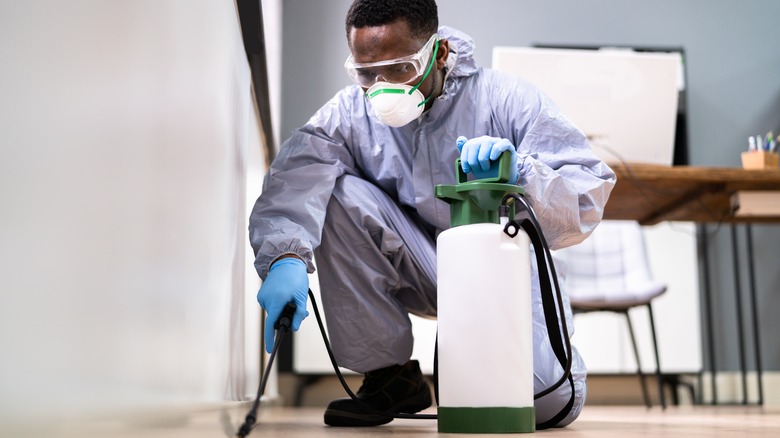Pest Control Clovis Solutions: Specialist Services at Your Doorstep
Pest Control Clovis Solutions: Specialist Services at Your Doorstep
Blog Article
Comprehending the Numerous Methods to Parasite Control: A Comprehensive Guide

All-natural Pest Control Techniques
Using environmentally friendly strategies such as companion planting and biological insect control is necessary for properly taking care of pests in agricultural settings. Buddy growing includes growing different crops in distance to discourage bugs, boost nutrient uptake, and boost overall crop wellness. Growing marigolds together with tomatoes can assist fend off nematodes. Intercropping maize with vegetables can disrupt the reproduction patterns of bugs like corn borers.
Organic parasite control includes introducing natural killers or virus to regulate pest populations. Ladybugs, as an example, eat aphids, controlling their numbers without the requirement for chemical pesticides. Another instance is the use of Bacillus thuringiensis (Bt), a microorganism that targets particular insect parasites while being harmless to human beings, animals, and beneficial bugs.
These eco-friendly techniques not just minimize the dependence on synthetic chemicals but likewise aid preserve biodiversity and dirt health. By integrating all-natural insect control approaches into farming techniques, farmers can achieve sustainable parasite management while lessening adverse effect on the atmosphere.

Chemical Parasite Control Solutions
Along with natural parasite control approaches, the application of chemical insect control options plays a substantial role in efficiently handling pest populaces in farming settings. Chemical parasite control solutions are formulated to target particular bugs that might trigger considerable damages to plants. These remedies often contain synthetic pesticides that are developed to eliminate insects rapidly and effectively.
One of the essential advantages of chemical insect control services is their efficiency in controlling insect infestations widespread. Farmers can apply these remedies making use of numerous approaches such as splashing, fumigation, or seed treatment to protect their plants from harmful insects, weeds, and conditions. In addition, chemical parasite control remedies are reasonably simple to apply and can supply fast results, aiding farmers guard their yields and decrease economic losses.
Nevertheless, it is vital to make use of chemical bug control solutions deliberately to lessen potential adverse influence on the environment, non-target microorganisms, and human health. Correct application techniques, adherence to safety and security guidelines, and normal monitoring are critical to make sure the liable use chemical parasite control services in farming practices.
Organic Pest Control Approaches
Biological pest control approaches take advantage of all-natural killers or virus to take care of pest populations in agricultural settings successfully. One typical organic control strategy is the intro of all-natural adversaries, such as ladybugs or parasitical wasps, to target specific pests.
Another organic control technique involves making use of pathogens like fungi, germs, or viruses to contaminate and eliminate parasites. In general, organic bug control methods supply a sustainable and targeted click here for more info remedy to pest administration in farming.
Integrated Insect Monitoring (IPM)
Integrated Parasite Administration (IPM) is a thorough method that incorporates different parasite control techniques to effectively manage and lessen pest populaces in agricultural systems. IPM concentrates on lasting prevention of bugs through a combination of organic, social, physical, and chemical control methods. By integrating these various approaches, IPM aims to minimize dependence on chemical pesticides, reduce ecological influence, and promote sustainable bug monitoring practices.
One secret facet of IPM is using biological controls such as natural killers, parasites, and virus to control bug populaces. This method harnesses the power of nature to preserve a balance in between pests and their all-natural opponents without creating injury to the atmosphere.
Additionally, IPM involves cultural techniques like plant habitat, sanitation, and rotation control to produce undesirable conditions for insects and disrupt their life cycles. Physical controls such as traps, barriers, and mulches are also utilized to stop insect infestations.
Mechanical and Physical Insect Control Techniques
Utilizing non-chemical approaches, such as physical and mechanical bug control methods, is a crucial aspect of extensive pest monitoring methods, developing upon the foundation of Integrated Pest Monitoring's alternative method. Mechanical pest control entails making use of physical barriers or catches to avoid insects from accessing and damaging plants or structures. This method can consist of methods like installing displays on windows, using row covers in agriculture, or employing sticky catches to capture insects.
Physical parasite control approaches, on the other hand, focus on straight getting rid of insects through physical methods. Using warmth treatments to get rid reference of bed bugs or vacuuming up bugs like ants or spiders can be reliable websites methods to take care of infestations without the usage of chemicals. By incorporating these physical and mechanical insect control methods right into an Integrated Insect Monitoring plan, individuals and specialists can lower reliance on chemicals while still effectively lessening and managing pest populaces damages.
Conclusion

In enhancement to all-natural pest control approaches, the use of chemical insect control solutions plays a substantial function in effectively taking care of pest populaces in agricultural settings.One of the essential advantages of chemical bug control services is their performance in managing pest problems on a large range.Integrated Insect Management (IPM) is a thorough technique that combines numerous insect control strategies to successfully manage and lessen pest populations in farming systems.Utilizing non-chemical approaches, such as mechanical and physical pest control methods, is an important facet of extensive parasite management methods, building upon the foundation of Integrated Pest Administration's all natural method. By including these mechanical and physical insect control strategies into an Integrated Insect Monitoring strategy, specialists and individuals can decrease dependence on pesticides while still efficiently handling pest populaces and minimizing damage.
Report this page